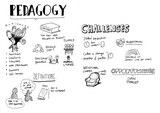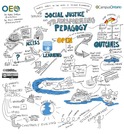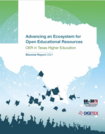
Plan to redesign the course so students can understand and use Software Engineering skills after graduation.
- Subject:
- Open Educational Resources & Practice
- Material Type:
- Syllabus
- Author:
- Soma Datta
- Date Added:
- 06/29/2023

Plan to redesign the course so students can understand and use Software Engineering skills after graduation.

This document represents the planning, strategy, logistics, and timeline for the TCC Connect Digital OER program. Use this resource as a guide to help build an OER program at your institution.

Code of Conduct used for Sessions.

Mobile Office Workspace by Maya Maceka on Unsplash is licensed under the Unsplash licenseWelcome to the Texas OER Core Elements Course! Your learning includes a series of self-paced online learning units. The 13 units can serve as an introduction to open educational resources (OER) as well as an opportunity for further exploration and discovery of OER and open education practices. Throughout the units there are opportunities for you to test your knowledge or further explore a concept.The modules allow you to learn at your own pace. While you can follow the modules in any order, it is recommended that you start with Unit 1 and progress through in order.

By the end of this unit, students should be able to:Provide a definition for open pedagogyDescribe the major components of a renewable assignment List three tools commonly used for the creation of renewable assignmentsList three considerations to keep in mind before changing your teaching styleExplain why it is important to scaffold learning in open pedagogy courses

Attributions

Considerations for Using Open Pedagogy

Other Approaches to Open Pedagogy

Renewable Assignments

What is Open Pedagogy?

Landscape Studies & Other Research on OER in Texas

OverviewOpen Educational Resources and Artificial Intelligence (AI) are both a part of the broader landscape of innovative strategies and initiatives that can support student success. Although the use of AI in higher education is not new, the launch of ChatGPT in late 2022 has led to innovative uses but also has raised concerns around such issues as bias, academic integrity, copyright, and the nature of truth. Regardless, these potentially transformative technologies likely are not going anywhere, and the need to adapt to innovation has never been more crucial. Fortunately, ethical and responsible use of AI can have a place in the higher education workplace, in research, and in instruction and learning. Increasingly, those working in open education are exploring harnessing AI to support the creation, adaptation, and adoption of OER. This unit explores some of these potential uses, while recognizing the ever-evolving nature of AI. By the end of this unit, students should be able to:Explain the basics of AI and generative AI, including their capabilities and limitations Describe commonly used platforms and tools for AI Summarize the evolving role of AI in higher educationIdentify ethical principles to address potential challenges in using AIOutline key principles and strategies for harnessing AI, specifically generative AI, to create or adapt OER, including in collaboration with studentsDescribe emerging practices for licensing and attributing work created with generative AI

AI in Higher Education

Concept Review & Attributions

Ethical Considerations

Harnessing AI to Co-Create OER with Students

Intellectual Property, Copyright, & AI

Leveraging AI to Create or Adapt OER

Platforms for Artificial Intelligence

Defining Artificial Intelligence